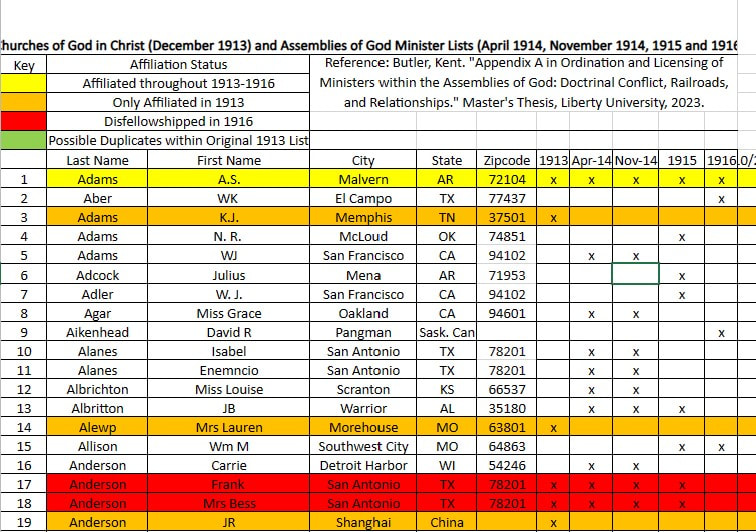A podcast of this history project is coming in Summer 2024!
Abstract
Since the Protestant Reformation, ordination within Protestant and evangelical movements has been a largely underemphasized field of study. Some historians have overlooked it entirely, while others have failed to grasp its overall significance to Christian belief, practice, and history. Studies on revivalism are prolific, but in-depth analysis of ordination practices within revivalism and specific revivalist denominations has been lacking. This study defends Robert Mapes Anderson’s thesis that cooperation, consolidation, and controversies in the Assemblies of God between 1914 and 1916 was due to the political struggle between two rival leadership groups. By comparing ministerial lists and mapping ministers’ location information, this study shows that Anderson’s thesis is undeniable. Doctrinal conflicts and power struggles over what were fundamental to ministry and faith, networks of relationships connected by railroads, and the role that women played in ministry were significant internal and external factors in the licensing and ordination shifts within the Assemblies of God.
Methodology
The key aspect of this study was tracking ministerial affiliations and associations over time. In its first three years of existence from 1914-1916, the Assemblies of God had a total ministerial roster of 1,111 ministers. This study complied the ministerial rolls of the Churches of God in Christ from December 1913 as well as tracking the affiliations and disaffiliations with the Assemblies of God in April 1914, November 1914, 1915, and 1916. This evidence buttresses Robert Mapes Anderson’s argument of rival factions being key to understanding the schism of 1916 and presents opportunities for further scholarship.
Of the 351 ministers affiliated with the Churches of God in Christ (predecessor to Assemblies of God led by Bell) in December 1913, only fifty-seven remained affiliated through the 1916 schism. Of the 351 ministers, 111 ministers never affiliated with the Assemblies of God. The strongest support for Anderson’s argument is that 145 of the 240 that had affiliated with the Assemblies of God in 1914 were disfellowshipped after 1916 when the Flower and Welch faction gained control of the General Council. Flower indicated that the ministerial roll dropped a total of 156 ministers from “585 to 429.” What Flower did not say is that all but eleven of those disfellowshipped came into the Assemblies of God movement from the Churches of God in Christ. Flower’s faction had gained control of the General Council and disfellowshipped those who departed from orthodoxy and doctrinally stood in their way.
Of the 351 ministers affiliated with the Churches of God in Christ (predecessor to Assemblies of God led by Bell) in December 1913, only fifty-seven remained affiliated through the 1916 schism. Of the 351 ministers, 111 ministers never affiliated with the Assemblies of God. The strongest support for Anderson’s argument is that 145 of the 240 that had affiliated with the Assemblies of God in 1914 were disfellowshipped after 1916 when the Flower and Welch faction gained control of the General Council. Flower indicated that the ministerial roll dropped a total of 156 ministers from “585 to 429.” What Flower did not say is that all but eleven of those disfellowshipped came into the Assemblies of God movement from the Churches of God in Christ. Flower’s faction had gained control of the General Council and disfellowshipped those who departed from orthodoxy and doctrinally stood in their way.



